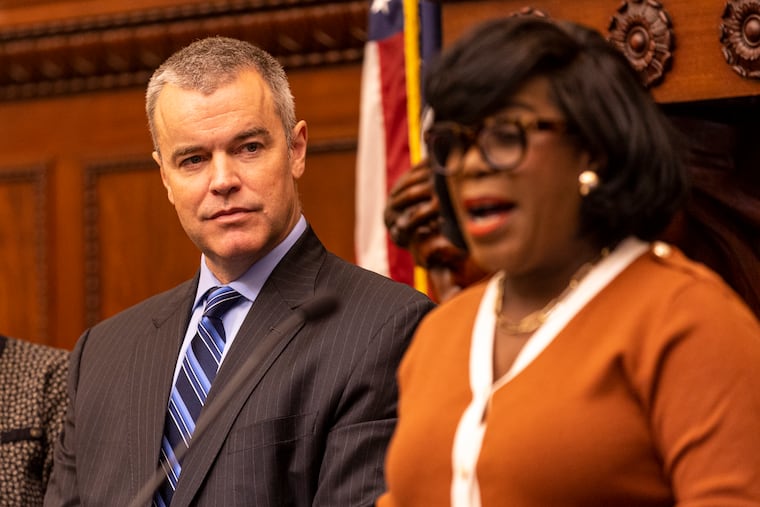Philadelphia could establish a triage center for people in addiction within weeks, official says
But the administration has yet to outline specifics, with one lawmaker saying that Parker’s funding request was akin to asking Council for “a hundred million dollar blank check.”

Mayor Cherelle L. Parker’s administration could open its first “triage center” for people in addiction within weeks, a top official testified to City Council on Monday, setting an aggressive timeline for one of the mayor’s strategies to end open-air drug markets.
But the administration has yet to outline specifics about where the facilities would be located, who would operate them, how many there will be, and what services they would offer, with one lawmaker saying that Parker’s funding request for the centers was akin to asking Council for “a hundred million dollar blank check.”
Council members peppered Parker’s top aides with questions at a hearing on the city budget on Monday, the first time members of her administration testified about her $6.29 billion budget proposal that keeps tax rates flat while adding resources for law enforcement and other priorities.
The hearing laid the groundwork for the next several months of budget negotiations, and funding the triage centers could be a key issue, with members seemingly divided Tuesday. Council and the administration must come to an agreement by the time the current budget expires at the end of June.
A half-dozen lawmakers centered their questions on Parker’s plan to borrow $100 million to fund new “triage and wellness facilities” that would operate as intake centers for people with substance use disorder. The specifics of the plan took on new urgency Monday after Managing Director Adam K. Thiel said the first facility could open within “weeks.”
Thiel described the funding as “seed” money and said he anticipates additional support from the city’s philanthropic community. He said that although Parker’s administration has concentrated on curbing the drug market in the city’s Kensington neighborhood — the epicenter of the city’s opioid crisis — triage facilities could be located in neighborhoods across the city.
“It starts with triage and bringing people in, making sure they have the services that they need, and then moving them through to medium-term help, care, treatment, and long-term housing and economic opportunity,” Thiel said. “What exactly does that look like? That is under development.”
» READ MORE: Philly City Council members are pushing for a Kensington ‘triage center’ for people who use drugs
Police Commissioner Kevin J. Bethel said the triage centers could serve as a home base for the department’s diversion program, which offers rehabilitation options to people facing criminal charges for low-level crimes like drug possession and prostitution.
“All too often we did not have a place to take someone. We make an arrest, they go through withdrawal, we take them to the hospital, cycle never ends,” he said. “Now we can treat the whole person.”
Some lawmakers chided the administration for not offering enough specifics about its plan, with Councilmember Jeffery Young Jr. saying, “There are no details.” Others — including Councilmember Quetcy Lozada, who represents Kensington — said the administration didn’t budget enough money to establish multiple facilities where people may need medical care.
And several progressive members expressed concern that the city would bring people in addiction to the facilities and force them to enter treatment to avoid criminal charges, a strategy that at-large Councilmember Kendra Brooks said “doesn’t work.”
She cited studies that show people forced into treatment before they are ready experience higher rates of relapse and overdose.
“I know people are ... concerned about some of the rhetoric surrounding the centers,” said Brooks, of the Working Families Party. “And I share their concerns.”
That prompted pushback from at-large Councilmember Jim Harrity, who lives in Kensington and speaks openly about recovering from alcohol addiction. He said many who are in recovery “were forced there one way or another, whether it was through our families, through a doctor, or through the court system.
“They are a threat to themselves and to others, so we have a moral responsibility to do whatever we can to try to save those people’s lives,” he said. “And reality is some of us don’t go willingly.”
Brooks later responded, saying the studies she cited weren’t “a Kendra Brooks thing, it’s a public health science thing.”
“I will have my staff send you over their data,” she told Harrity. “Because I did not make it up.”